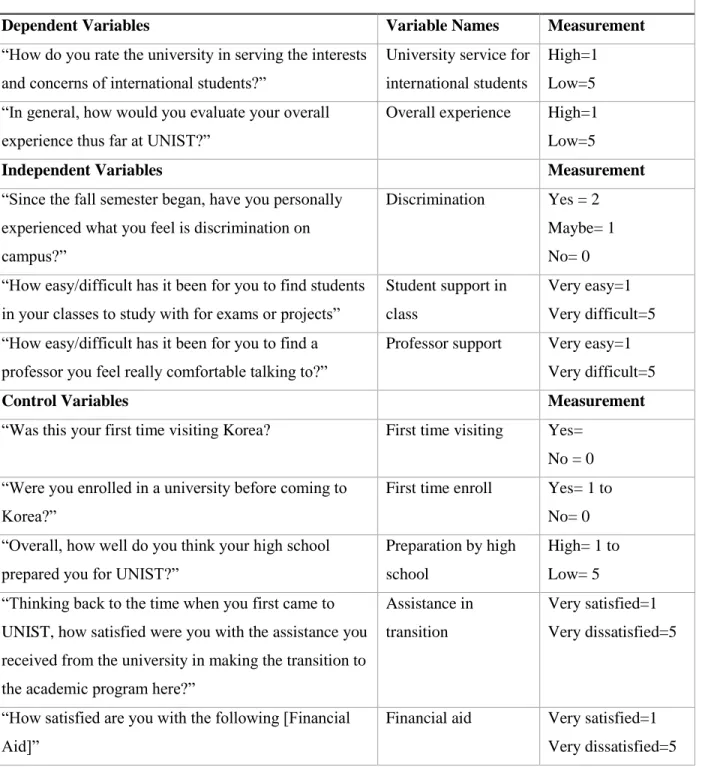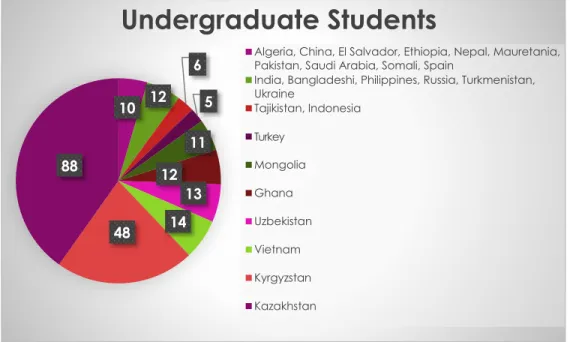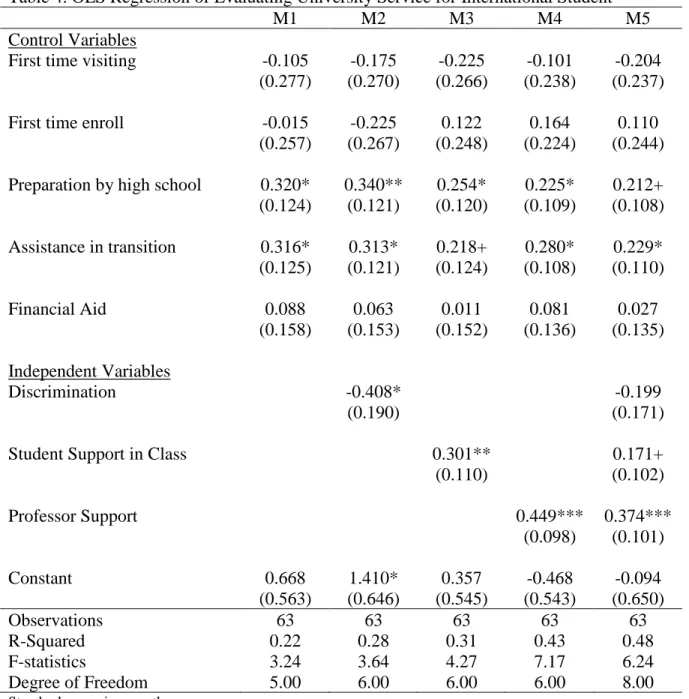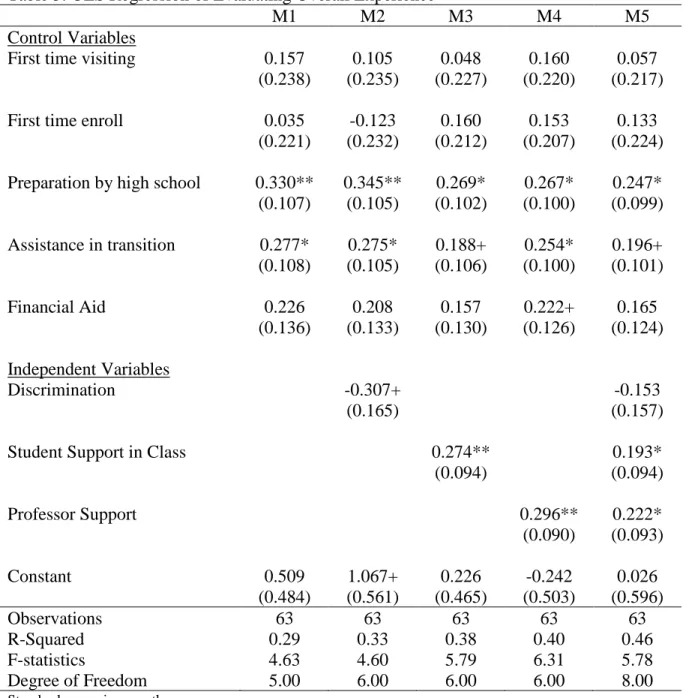This study investigated UNIST international students' satisfaction rate in both academic and social life on campus. International students face many challenges, such as culture shock, language problems, homesickness and difficulties in academic life. This study also suggests that some preparations must be made by the university that will embrace international students upon their arrival.
I have two hypotheses to explain international students' overall experience and perception of their college life. Of course, the issues that international students face are different from each other depending on the individual's background, financial capabilities and ability to culturally adapt. Further, in this study, the experiences of international students of the Ulsan National Institute of Science and Technology (UNIST) were examined in the academic and sociocultural settings.
International students face many challenges such as language difficulties, culture shock, homesickness and financial problems, etc. Knowing about these issues will reduce the dropout rate of international students and increase the overall experience at university. In this section I will talk about the general concept of university campuses with international students.
Discrimination puts international students at greater risk for psychological problems, such as depression and poor psychological well-being.
Hypothesis
International students are able to bring stories, experiences, cultures, religions, ideas, and beliefs to the college campus population that may not otherwise be exposed. But there are many social and other factors that influence the enrollment of international students in a university, for example, education quality, lifestyle of destination country, possibilities to get a job after graduation, etc. Also providing campus safety and discrimination-free atmosphere will help international students to adjust more easily and have less problems in their new environment.
Studies show that it is very common for international students to experience homesickness and loneliness because they have had health problems, depression and poor work performance. Also, due to an overload of academic studies and limitation of foreign language, international students have a hard time making friends other than their classroom. There are three dimensions that I examine to explain international students' perception of their college experience.
However, many international students feel that opportunities for interaction are often limited by language, differences in host culture, the number of locals the student has access to, whether the student has family to rely on or care for, and previous cross-cultural experiences. experience (Al-Sharideh and Goe, 1998; Brown, 2009; Chapdelaine and Alexitch, 2004; Lee et al., 2004; Peacock and Harrison, 2009; Trice, 2004; Zhao et al., 2005). Research (Campbell & Campbell, 1997; Kuh & Hu, 1991) indicates that student-faculty relationships are the most critical link within the faculty community. It is generally accepted that student-faculty interactions generally have a positive impact on students' cognitive growth and development (Astin, 1993; Pascarella & Terenzini, 2005).
For example, Pascarella and Terenzini (1977) found that several types of interactions between students and teachers have significant predictive value. International students have common problems when they study abroad, such as depression, loneliness and anxiety. H1: Discriminatory experiences at university are negatively associated with international students' evaluation of their university experience.
H2: Maintaining good social relationships at college is positively related to international students' evaluation of their college experience.
Empirical Context
To overcome these problems, universities conduct a survey with international students to find out their problems and difficulties. The findings will help them address students' problems and difficulties when they first come to college. Ulsan National Institute of Science and Technology (UNIST) is one of four public universities in South Korea dedicated to research in science and technology.
First, despite being a national university in Korea, 100% of courses at UNIST are taught in English, and the school actively seeks ways to recruit international students and professors. Third, UNIST has used the flipped learning approach in its classrooms to promote active student participation and mastery of the core science and engineering subjects (UNIST Wikipedia). Newly admitted students are offered a scholarship that fully covers tuition costs and entry fees.
All students are enrolled as non-majors and must major in two or more tracks to build their own creativity. It's so much easier to make friends with other international students because they know what you're going through. In addition, international center provides information and assistance to international students and scholars to help them adjust to life in Korea, and help them live in a cultural environment different from their home country.
UNIST offers several programs for international students to give them a perspective on Korean culture and experience of Korea. All the international students will participate in an industrial trip to Hyundai Heavy Industries, Hyundai Motors Factory and SK Energy. Booths are set up where international students introduce their cultures and home countries to other students with pictures, food, traditional costumes and music.
First, only one student from each of these 10 countries Algeria, China, El Salvador, Ethiopia, Nepal, Mauritania, Pakistan, Saudi Arabia, Somalia, Spain studies at UNIST. The second largest number of international students is from Kyrgyzstan, with a total of 48 students. First, one student came from Algeria, Bangladesh, Brazil, Cameroon, Ghana, Japan, Mongolia, Nepal, Poland, Rwanda, Singapore.
Research Methodology
First question explains the rating on how the universities look after international students' interests and concerns. Knowing the international students' overall experience at the university will help universities attract more international students. Second question asks whether it is easy or difficult for you to find your classmate to study with.
Most of the international students find it difficult to adjust to the academic life abroad when they first came. The last question is about how easy or difficult it is to find a professor you feel comfortable working with. Although they are not main independent variables, I wanted to control to see the effect of the result.
To assess the effects of the independent variables, I performed descriptive statistics, correlation, and ordinary least squares (OLS) regression. I included all control variables in the OLS (first visit, first enrollment, preparation for high school, discrimination). In the remaining steps, I added the independent variables one by one to the control variables (M2, M3, M4).
Findings of the Study
In all models, first visit and first enrollment are negatively related to the university's services to international students. High school preparation has a positive effect on university services to international students (coeff. = 0.320, p<.05). If your high school has prepared you well for UNIST, the university's service for international students will receive a higher rating.
Transition assistance has a significant positive effect on university services for international students (coeff. = .0316, p<.05). If you have received satisfactory assistance in your transition to UNIST, you will rate the university's services for international students higher. If you experienced more discrimination, you will rate the university's service for international students lower.
Model 3, student support has a significant positive effect on the university's services to international students (coeff. = 0.301, p<.01). If you can easily find a student in your class to study with, you will score higher in the university's services for international students. In Model 4, teacher support in the classroom has a significant positive effect on university services for international students (coeff. = 0.449, p < .001).
Students who easily found a professor comfortable to talk to are highly rated in university service for international students. If your high school prepared you well for UNIST, your overall experience at UNIST will be higher. If you had satisfactory assistance in transition when you first came to UNIST, you will likely be rated highly on overall experience at UNIST.
In Model 3, student support in the classroom has a significant positive effect on overall experience (coefficient = 0.274, p<.01). If it is easy for you to find a student in your class to study with, then you tend to rate the overall experience at UNIST highly. If it is easy for you to find a professor who is comfortable to talk to, then the rating of the overall experience will be higher.
Discussion and Conclusion
13 7.2 Conclusion
The investment is not only their education they receive, but students can also learn different culture, language and social life. Most of the students will have different perspectives on life and other issues because they study and live in different countries. Ethnic communities within the university: An examination of factors influencing the personal adjustment of international students.
Revisiting the role of cultural capital in East Asian educational systems: The case of South Korea Educational systems of Asia: The case of South Korea. The Importance of an International Education http://www.isasonline.org/international-news/the-importance-of-an-international-education.
17 Table 1. List of Undergraduate and Graduate Students
18 Figure 1. Undergraduate Students
Undergraduate Students
Graduate Students
How do you assess the university in serving the interests and concerns of international students?”. Since the beginning of the fall semester, have you personally experienced what you believe to be discrimination on campus? How easy/difficult was it for you to find a professor you feel comfortable talking to?”.
When you think back to the time when you first came to UNIST, how satisfied were you with the assistance you received from the university in making the transition to the academic program here?”.



